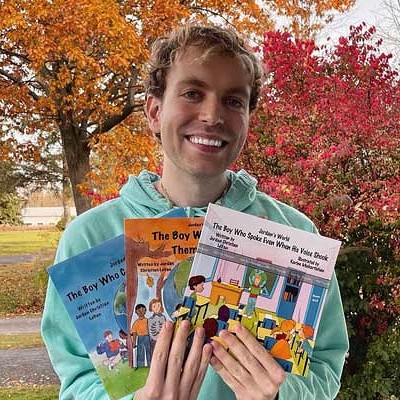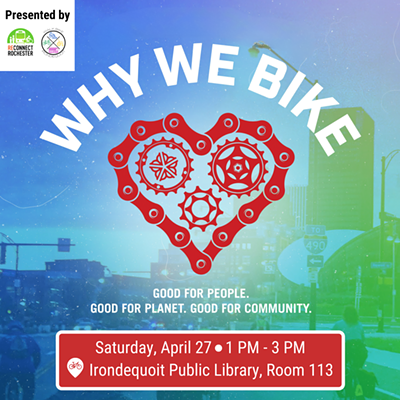DISH '12: Coffee guide
Buzz worthy: Get to know the small-batch coffee roasters of Rochester
By James Leach[
{
"name": "500x250 Ad",
"insertPoint": "5",
"component": "15667920",
"parentWrapperClass": "",
"requiredCountToDisplay": "1"
}
]
At his roastery located inside Java's at the Market, Joe Palozzi, who has been roasting coffee beans in the Rochester area under one name or another for more than 30 years, pulls a tiny scoop from the latest incarnation of his century-old coffee roaster and looks closely at the smoking beans heaped in it. He turns the scoop this way and that in the morning light. He slides it back in to the roaster, and pulls another sample before walking back to his chair to chat for a few minutes.
"You gotta have a good-quality bean," Palozzi says, waving in the direction of a pallet heaped with burlap sacks of green coffee beans next to the massive roaster. "The beans will tell you how they want to be roasted." A few minutes later, he opens the door on the roaster and an avalanche of medium-brown beans spills out along with a gust of acrid smoke that fills his roastery for a few minutes. He grabs a wooden paddle and starts moving the beans around, helping them cool quickly enough that the oil inside them doesn't bleed out -- the rough equivalent of resting roasted meat to keep the juices inside. Once the air clears, the smell of the beans is intoxicating, a mix of chocolate and, oddly, flowers with just a whisper of smoke.
Across town, Rochester's newest coffee roaster, Benjamin Turiano at Joe Bean Coffee Roasters on University Avenue, is tweaking the time and temperature graph on the computer attached to his coffee roaster. The basic machine looks not unlike the one Palozzi uses, but the hardware attached to it, and indeed the room in which it sits, looks like a university research lab. Turiano combines his knowledge of the growth region, farm, harvest date, and type of beans he roasts with a connoisseur's sense of flavor, aroma, and texture, creating a profile database for each type of bean that he roasts. This information, combined with ultra-fine control over temperature over the course of the roasting cycle, creates coffees that are engineered to be brewed slowly and meticulously. Served in small quantities with great ceremony, they are meant to be savored and appreciated like fine wines. At Joe Bean Coffee Roasters on University Avenue, you don't drink coffee, you "cup" it -- sniffing and tasting your way to blackberries, oranges, caramel, cinnamon, toasted nuts, nutmeg, and wood inside your tiny tasting glass.
Palozzi and Turiano define the extremes of coffee roasting in the Rochester area, an old guard and a new in the field of artisanal, small-batch coffee roasting. Within this relatively small field there are a variety of approaches to roasting coffee, and wide variations in quality and consistency between roasting establishments. French roast, for instance, at three different places varied widely in color, flavor, and intensity, returning three strikingly different coffees ranging from intense but refreshing to muddy and burnt tasting. There is, as Turiano told me, no local equivalent to the home-beer-brewers' clubs and associations for coffee. And there's very little in the way of standards to describe various roasts. Every roaster is free to roast to his or her own understanding of the various styles and flavor profiles, falling back on personal tastes, experience, and customer feedback in producing beans that sell. Popularity is the sine qua non of a "good" roast.
In our area, it seems that every third business that opens is a coffee shop of one sort or another. But most of them purchase their beans from third-party roasters with large suburban production facilities, or exist as branches or franchises of larger operations like Buffalo-based Spot or the national chain Starbucks. There are relatively few businesses in the Rochester area that actually roast their beans in the same place that you can buy them and drink coffee made from them. Java's at the Market (a branch of the Java's family of coffee shops, which roasts at the Public Market and distributes to its five locations and to various restaurants, including Good Luck on Anderson Alley); Canaltown Coffee Roasters (which roasts at its location on East Avenue); Boulder Coffee (also roasts at the Market); Coffee Connection (a not-for-profit collective that roasts at its flagship shop on South Avenue); and Joe Bean Coffee Roasters (formerly of Webster, but roasting from its facility on University Avenue for the past year). All of these are small-scale, single-roaster operations, turning out a labor-intensive product in relatively small, expensive, but very quick-selling quantities.
The typical coffee roaster -- the machine, not the person -- holds 12kg (or 26 lbs.) of green coffee beans at a time. Most roasts take about 30 minutes to complete, not including sorting the beans before roasting them, cooling them afterward, or the time that the beans must rest before they can be used. This small scale of production creates a product that is both limited in quantity, labor intensive, and relatively expensive.
Most good-quality beans sell at retail between $15 and $20 per pound (the green, unroasted, beans command less than a tenth of that price from the grower and about a third of that from coffee brokers in large cities like New York). Specialty beans, particularly from small producers or Fair Trade and organic growers, can cost significantly more -- sometimes more than $30 per pound. In the way of businesses in which the difficulty of obtaining or creating the item not only contributes to its cachet but also justifies its cost, coffee roasters will often go on at length about the quality of their beans, the work involved in searching for them or negotiating special deals in developing countries, or the mystery and art of roasting and brewing their coffee. To a coffee roaster, particularly a specialty roaster who spends several hours a day tending his or her beans, there is no such thing as "just a cup of coffee."
Peter Pelletier, who has been roasting beans for his Canaltown Coffee Roasters on East Avenue for a bit more than 20 years, is a fine example of the artisanal roaster in action. His shop is small, tucked in the elbow of a tiny strip mall on the corner of Winton Road and East Avenue. His roasting room is even smaller: it has just enough room for his massive Probat roaster (the German company Probat is one of the largest roaster manufacturers in the world), a rack of syrups for use in flavored coffees, a sorting table, and a narrow aisle in which he can stand while he tends the beans. Bags of raw beans are stashed throughout the shop both for convenience and decoration.
On a normal day, Pelletier will roast for four or five hours, running through eight to 10 batches of beans, most of which will go out the door as either beans or cups of coffee within a week of roasting. You can come into the shop and order a cup of dark roast or his medium roast Rochester blend -- a caffeine-forward coffee with a surprisingly full body and an aggressive finish that will surely snap you out of your morning haze. But you'd do well to let him step out from behind the counter and take you on a walk through his wares, which include a wall full of bins of house-roasted beans, and candy jars brimming with specialty beans from small farms in distant lands.
Pelletier, like Palozzi, has a philosophy of roasting that raises it to an art form, or at least a highly refined craft. "There are subtle flavors and differences in each bean," he says over a cup of silky-smooth, flowery tasting Costa Rican Lamanita coffee (he spent about 10 minutes telling me about his visit to the plantation where the beans are raised, and sharing a coffee-table book about the place and its beans). "There is an optimum roast for each bean, and depending on where it's from, it will give you what you need. The region really helps -- you don't want to over-roast something from Central America or Africa, but Indonesian you can roast as dark as you want because it's dark and syrupy already."
Pelletier and Palozzi got into the coffee business, and have stayed there for most of their working lives, out of love for a good cup of joe and the desire to share that love with the world. But that's not the only way that Rochester's roasters have found their way into the business. Lyjha Wilton, founder of the Boulder Coffee family of coffeehouses, got into the business in large part because he couldn't find a tenant for the site that became his flagship store on the corner of Alexander Street and Clinton Avenue. As he tells it, the coincidence of having an empty rental property and the acquisition of a high-quality espresso machine for a song at an auction got him into the coffee business.
The first Boulder opened in 2005. Today there are five branches of the chain, including a robust presence at the Public Market that anchors what is quickly becoming a mini-Market in itself -- it is now home to vendors of specialty Italian cookies, artisan olive oil, high-end meats, and superlative Mexican food each Saturday.
For Wilton, who purchased the Java Joe trademark along with the building at 1 Public Market in 2009, coffee is a business and a profitable one: he told me that he just recently sealed a deal to distribute Boulder-branded coffees at Wegmans supermarkets in the Rochester area, and he looks forward to future growth. Wilton, though, is not a roaster himself.
When Wilton purchased the Public Market space he hired a roaster with 10 years of experience to take over its operations. The direct-fire coffee roaster was already in the building. That is the roaster that Boulder uses today, roasting 12 hours each week to produce the 12 to 15 varieties of coffee that the shop sells as beans at the Market and brews at its other locations. Wilton says that getting the roast right and learning the nuances of the roaster was a "steep learning curve," but one that resulted in a distinctive taste and style for his Fair Trade, organic beans.
Joy Bergfolk, executive director of the not-for-profit coffee house Coffee Connection on South Avenue, also sells Fair Trade beans. Roasted in a Probat roaster by Cathy Martin, who learned her trade six years ago from the Coffee Connection's founder Nancy Sawyer-Molina, Coffee Connection's beans are a little darker than those of its peers (I found its French roast to be darker and more aggressive than any other I tasted), but Martin's lighter and medium-bodied roasts are pleasant and have well-balanced acidity and a clean finish.
While the product is ultimately important, there are other reasons to support Coffee Connection, chief among them that the shop is the public face of Project Empower, a faith-based organization dedicated to helping women recovering from abuse and addiction to get back on their feet again. As Bergfolk put it, "If you are socially conscious, Coffee Connection is a no-brainer place to get your coffee," letting you support a worthy cause, a growing local business, and the idea of Fair Trade while sipping a certified organic brew.
All roasters are acutely conscious of where their beans come from -- although not all of them adhere to the Fair Trade line. Many, like Peter Pelletier and Joe Palozzi, travel to the places their beans come from to see how they are grown and negotiate sales directly, imbibing a bit of the flavor of the beans' terroir in the process. But nowhere in Rochester is the point of origin of your beans, and the time when they were harvested, more important -- or perhaps more clearly articulated for you -- than at Joe Bean Coffee Roasters on University Avenue.
Joe Bean is the outgrowth of a more pedestrian coffee business of the same name, founded by Kathy Turiano in Webster in 2004. That business, which roasted largely for the wholesale and restaurant trade, provided a launching point for Turiano's newest venture -- an effort to elevate coffee to the status of wine or craft beer -- in 2008. Open for a little more than a year at its University Avenue location with Turiano's self-taught son, Benjamin Turiano, acting as head roaster, Joe Bean is not a place where you just drop in for a mere cup of coffee. It's an experience that must be savored. Take a seat at the bar in the tasting room and you'll likely be asked whether you'd like a flight of coffee. Those familiar with wine and beer tastings will understand the format, if not the context. For $7 you get about nine ounces of coffee and an intricate performance and presentation not unlike a Japanese tea ceremony.
Standing next to a 4' tall glass apparatus that I've since been told is a Kyoto coffee drip (to me it looks like Wyle E. Coyote's chemistry set), my barista measured boiling water with a chemist's precision, and eventually delivered me three beakers -- along with printed tasting notes -- on the coffees that I'd ordered. Trust me when I tell you that at this point you should not ask for sugar, regardless how you normally take your brew.
The coffees were certainly distinctive. Unlike others that I drank over the course of three days, there was a clear difference between the beans and their roasts. The Joe Bean Blend, a mixture of Mexican and Colombian beans, has a well-balanced roastiness. Colombian Ocamonte beans -- harvested between September and January, grown in a low pH mixed soil at 1,200 to 1,700 meters above sea level, perhaps by a left-handed man wearing a blue shirt -- were slightly smoky and very round in the mouth. And Ethiopian Sidama beans had an almost citrusy tartness that would make a great palate cleanser between courses of a lavish meal. But I kept thinking how much better they might have been with just a touch of sugar.
That said, what Kathy and Benjamin Turiano are doing at Joe Bean, although a bit ahead of its time, is important and interesting. It's an attempt to bring the same sort of rigor and craft to coffee roasting as has been brought to bear on other craft beverages over the centuries. But those who drop into Joe Bean looking for a quick morning pick-me-up rather than an experience might be better served to grab a cup of joe elsewhere. Getting a simple cup of coffee can take 15 minutes or more and would certainly overtax my caffeine-starved brain in the morning.
At Java's on Gibbs Street on a recent spring afternoon, the tables outside are full. The line at the counter snakes around the inside of the shop and threatens to spill out the door. Owner Mike Calabrese sits with me watching the queue inch forward (his partner Chuck Cerankosky pops out of the kitchen briefly on his way out to the Public Market, where the pair is putting the finishing touches on their newest restaurant venture, Cure). Customer after customer orders coffee, more often than not by size of the cup rather than roast. The question of what beans are being used doesn't come up at all. Almost everyone goes from the cashier straight over to the stand where the milk and sugar are kept fully stocked.
Calabrese tells me that the two coffees I'm drinking are from Guatemala and Sumatra, and that they were roasted for him by the original "Java" Joe Palozzi. Boulder got the name, he says, "but we'd rather have the coffee." I can detect a slight difference between the brews and a bit of the signature roastiness that all of Palozzi's coffees have, but I'm not convinced that if you mixed them up I'd be able to tell you which is which. What I can tell you is that they are both wonderful, that the people watching is good, and I'm suddenly having a very good time.
In This Guide...
Speaking of...
-

Schittin Good Coffee: Good to the last plop
Apr 30, 2021 -

Love at first sight
Mar 4, 2020 -
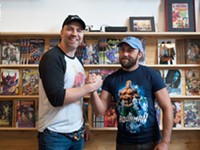
East Avenue gets a comics-coffee-cereal bar
Apr 2, 2018 - More »
Latest in Dish
More by James Leach
-

DINING REVIEW: Orange Glory Cafe
May 15, 2013 -
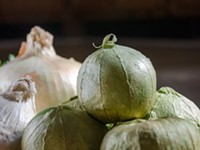
Dish 2013: Updating the kiddie menu
May 8, 2013 -
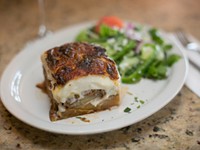
DINING REVIEW: Opa Authentic Greek Koozina
May 1, 2013 - More »



